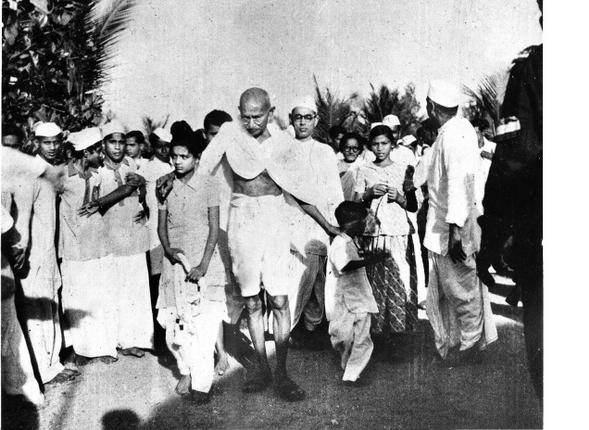January 7
“Sometimes non-cooperation becomes as much a duty as cooperation.”
-Gandhi (Young India 1-19-1921)
In Sanskrit, the word for “duty” is dharma. There is an expression repeated throughout the Indian spiritual tradition, ahimsa paramo dharma, nonviolence is the highest dharma, or duty. There should be no wonder why Gandhi was so keen on duties. It is in the performance of our nonviolent duties–spiritual and political — that we gain greater and greater freedom.
Nonviolence, moreover, has two sides: cooperation and non-cooperation. While non-cooperation tends to get all of the press and media, the power of nonviolent cooperation is often overlooked. We do ourselves a disservice when we forget to appreciate how hard it is for people to get along in a culture that has created so deep a sense of separateness.
It’s easy enough to enrage people about a certain issue and get them out into the road to block traffic or to refuse to pay taxes as forms of non-cooperation; but is it not more difficult to truly cooperate with our fellow human beings toward the actual creation of more just arrangements? Isn’t it presented to us as somehow easier to simply continue to fight against one another, creating “us and them” dichotomies, instead of focusing on the commonalities and potential solutions that bring us together? To overcome the age-old tactic of “divide and conquer,” Gandhi is telling us, we must instead, “unify and resist.” When everything is telling us to stay separate, loving cooperation comes as a subtle, difficult challenge.
This is where our two nonviolent dharmas take on new light: We can only break down the walls of separateness between us if we first non-cooperate with the insecurities, hatred, malice, criticisms and personal resentments in our own hearts. We must by all means refuse what these impulses ask of us, even do the opposite. Before we are asked to resist one another, we can learn to resist ourselves. In doing so, we gain keen insight into human nature and critical insight into when to move toward constructive work and when it’s time for civil disobedience. Gandhi reminds us: to nurture our capacity get along with others, not excluding resisting their actions when necessary, is our first duty of duties, and the core of the revolution.
Experiment in Nonviolence:
Consider the ways that you can work with those who differ from you toward an even higher goal that benefits everyone.
Daily Metta 2015, a service of the Metta Center for Nonviolence, is a daily reflection on the strategic and spiritual insights of Mahatma Gandhi in thought, word and deed. As Gandhi called his life an “experiment in truth,” we have included an experiment in nonviolence to accompany each Daily Metta. Check in every day for new inspiration. Each year will be dedicated to another wisdom teacher.









